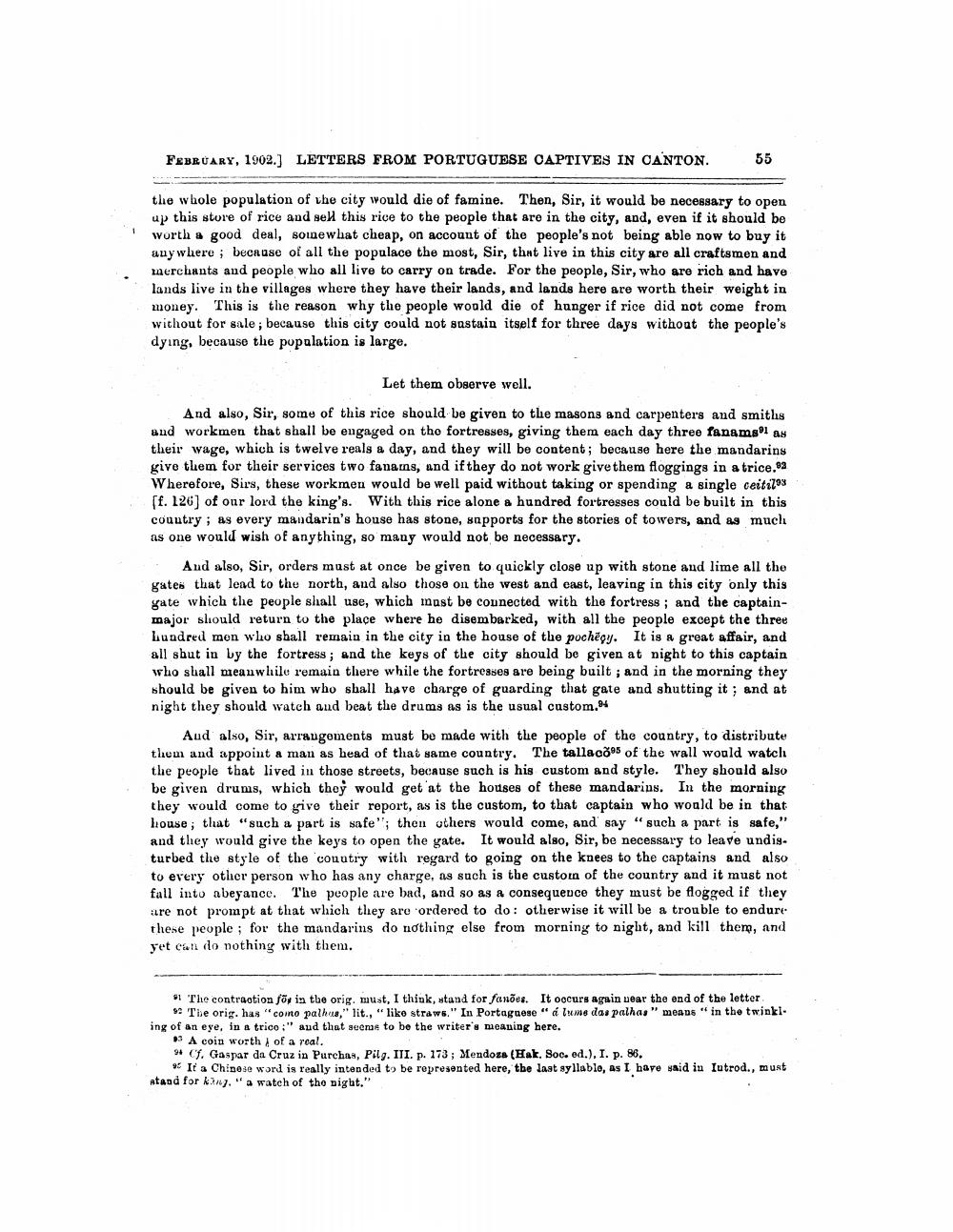________________
FEBRUARY, 1902.] LETTERS FROM PORTUGUESE CAPTIVES IN CANTON.
the whole population of the city would die of famine. Then, Sir, it would be necessary to open up this store of rice and sell this rice to the people that are in the city, and, even if it should be worth a good deal, somewhat cheap, on account of the people's not being able now to buy it anywhere; because of all the populace the most, Sir, that live in this city are all craftsmen and merchants and people who all live to carry on trade. For the people, Sir, who are rich and have lands live in the villages where they have their lands, and lands here are worth their weight in money. This is the reason why the people would die of hunger if rice did not come from without for sale; because this city could not sustain itself for three days without the people's dying, because the population is large.
55
Let them observe well.
And also, Sir, some of this rice should be given to the masons and carpenters and smiths and workmen that shall be engaged on the fortresses, giving them each day three fanams9l as their wage, which is twelve reals a day, and they will be content; because here the mandarins give them for their services two fanams, and if they do not work give them floggings in a trice.92 Wherefore, Sirs, these workmen would be well paid without taking or spending a single ceitiles [f. 126] of our lord the king's. With this rice alone a hundred fortresses could be built in this country; as every mandarin's house has stone, supports for the stories of towers, and as much as one would wish of anything, so many would not be necessary.
And also, Sir, orders must at once be given to quickly close up with stone and lime all the gates that lead to the north, and also those on the west and east, leaving in this city only this gate which the people shall use, which must be connected with the fortress; and the captainmajor should return to the place where he disembarked, with all the people except the three hundred men who shall remain in the city in the house of the pochegy. It is a great affair, and all shut in by the fortress; and the keys of the city should be given at night to this captain who shall meanwhile remain there while the fortresses are being built; and in the morning they should be given to him who shall have charge of guarding that gate and shutting it; and at night they should watch and beat the drums as is the usual custom.
Aud also, Sir, arrangements must be made with the people of the country, to distribute them and appoint a man as head of that same country. The tallacos of the wall would watch the people that lived in those streets, because such is his custom and style. They should also be given drums, which they would get at the houses of these mandarins. In the morning they would come to give their report, as is the custom, to that captain who would be in that house; that "such a part is safe"; then others would come, and say "such a part is safe," and they would give the keys to open the gate. It would also, Sir, be necessary to leave undisturbed the style of the country with regard to going on the knees to the captains and also to every other person who has any charge, as such is the custom of the country and it must not fall into abeyance. The people are bad, and so as a consequence they must be flogged if they are not prompt at that which they are ordered to do: otherwise it will be a trouble to endure these people; for the mandarins do nothing else from morning to night, and kill them, and yet can do nothing with them.
The contraction for in the orig. must, I think, stand for fanões. It occurs again near the end of the letter 92 The orig. has "como palhus," lit., "like straws." In Portuguese "á lume das palhas" means "in the twinkl ing of an eye, in a trico:" and that seems to be the writer's meaning here.
A coin worth of a real.
9 Cf. Gaspar da Cruz in Purchas, Pilg. III. p. 173; Mendoza (Hak. Soc. ed.), I. p. 86.
If a Chinese word is really intended to be represented here, the last syllable, as I have said in Introd., must atand for king," a watch of the night."




